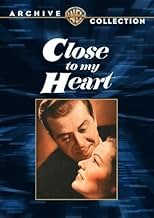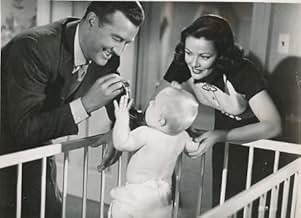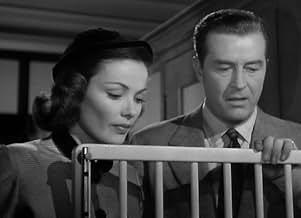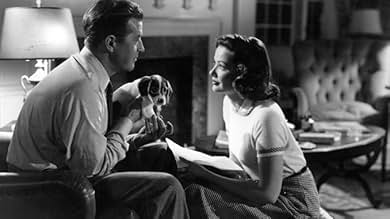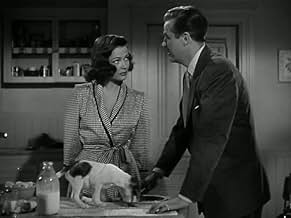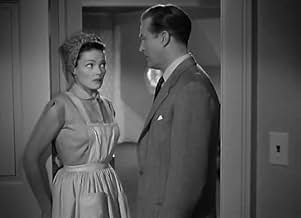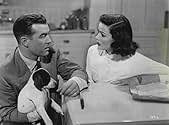CALIFICACIÓN DE IMDb
6.5/10
561
TU CALIFICACIÓN
Agrega una trama en tu idiomaA columnist and his wife deal with obstacles when they try to adopt an abandoned baby.A columnist and his wife deal with obstacles when they try to adopt an abandoned baby.A columnist and his wife deal with obstacles when they try to adopt an abandoned baby.
- Dirección
- Guionistas
- Elenco
Baby John Winslow
- Baby Danny
- (as Baby John)
John Alvin
- Prospective Adoptive Father
- (sin créditos)
Rodney Bell
- Young Parent in Car
- (sin créditos)
Nan Boardman
- Woman Patient
- (sin créditos)
Ralph Byrd
- Charlie
- (sin créditos)
Luther Crockett
- Prison Warden
- (sin créditos)
Douglas Hudson Finley
- Baby in other car
- (sin créditos)
Elizabeth Flournoy
- Dr. Williams's Receptionist
- (sin créditos)
Dick Gordon
- Clothing Store Owner
- (sin créditos)
Fred Graham
- Prison Guard
- (sin créditos)
Opiniones destacadas
10gulfhorn
Please help me to purchase this movie, if it is available. Ray Milland and Gene Tierney were excellent and the plot was played very well. I checked once to purchase the movie but was told it wasn't available for some reason or another. It has been 30 years since I saw it, I have always wanted to see it again. I have told my wife and kids about ti as well, and they too want to see it. I hope someone will be able to let me in on whether or not and where I can buy the VHS or DVD copy. This movie was based on a reporter and his wife's challenge to adopt a baby. When someone mentions to the reporter, Ray Milland, that he needed to be careful as to not get a bad seed, he almost ruins the happy moment.
Thanks
Thanks
This is a pretty good little film about a couple adopting a baby. It works best when it is looking at the couple at home dealing with the new child, or when they adopt a puppy as a substitute. This is all quite charming and although Gene Tierney is a little cloyingly sweet at times (and I might add ravishingly beautiful), Ray Milland is very good. Where the film is less successful is when it traces Milland's search for the baby's real parents - this all becomes a tad melodramatic. And Fay Bainter's oh-so-well-meaning adoption agency supervisor comes over as so mean and heartless in her treatment of Tierney that the film becomes unbelievable. She tortures the poor woman! Milland's final impassioned monologue to Bainter is impossible for any actor to play but Milland has a good stab at it. Overall very entertaining.
If anything, this film is a good example of what it means to take something into context. There was a serious stigma of adoption around, as well as long before, the decade/century this film was made. I admire it for its attempt to debunk it.
Milland's performance is adequate, although I agree with another reviewer who finds it difficult to like his character. What surprised me is Tierney's performance. I think her range as an actress was sadly discounted, especially after the success of Laura and Leave Her To Heaven. She proves in this movie, at least to me, she was capable of just about any role; and Night And The City is excellent proof.
If you're a fan of supporting actress Fay Bainter, this is a must-see.
Milland's performance is adequate, although I agree with another reviewer who finds it difficult to like his character. What surprised me is Tierney's performance. I think her range as an actress was sadly discounted, especially after the success of Laura and Leave Her To Heaven. She proves in this movie, at least to me, she was capable of just about any role; and Night And The City is excellent proof.
If you're a fan of supporting actress Fay Bainter, this is a must-see.
Uncommonly beautiful California housewife Gene Tierney (as Midge) is devastated. Doctors have told Ms. Tierney she will not be able to bear children. Being a "stay at home mom" is out of the question, so "Post" newspaper columnist husband Ray Milland (as Brad Sheridan) buys Tierney a puppy. The dog is precious, but it's not the same as having a baby. "Life is more than just babies," explains Mr. Milland, "we can be footloose." But Tierney is still teary-eyed. Milland suggests the couple adopt a child, and Tierney beams. Alas, the waiting time could take two years. Their luck changes, however, when abandoned baby John Winslow (as Danny) is mysteriously left on a police station doorstep...
Even before she sees him, Tierney is immediately attached to the baby. But Milland wants to know more about the child. His desire to investigate baby Danny's possibly unstable background puts a strain on the Sheridan relationship. Adoption specialist Fay Bainter (as Mrs. Morrow) wonders if Milland displays the proper level of fatherly love. "Close to My Heart" is a good looking production, much like a soap opera with one storyline. Director William Keighley gives it a classic look. The intriguing part of the story involves Milland pondering the "nature vs nurture" question. He hopes "bad blood" is not inherited. The resolution is satisfying and baby "Danny" delivers a cute, natural performance.
****** Close to My Heart (1951-10-10) William Keighley ~ Ray Milland, Gene Tierney, Fay Bainter, John Winslow
Even before she sees him, Tierney is immediately attached to the baby. But Milland wants to know more about the child. His desire to investigate baby Danny's possibly unstable background puts a strain on the Sheridan relationship. Adoption specialist Fay Bainter (as Mrs. Morrow) wonders if Milland displays the proper level of fatherly love. "Close to My Heart" is a good looking production, much like a soap opera with one storyline. Director William Keighley gives it a classic look. The intriguing part of the story involves Milland pondering the "nature vs nurture" question. He hopes "bad blood" is not inherited. The resolution is satisfying and baby "Danny" delivers a cute, natural performance.
****** Close to My Heart (1951-10-10) William Keighley ~ Ray Milland, Gene Tierney, Fay Bainter, John Winslow
I remembered this movie from years ago, and somehow I had it stuck in my mind that James Stewart played the husband - it was the kind of role he was good at, especially the emotional closing scenes, but instead it is Ray Milland as journalist Brad Sheridan and Gene Tierney as Midge Sheridan. The opening scene shows a doctor telling Midge that she will never be able to have a child. She takes the news hard, but then she and her husband of four years begin looking for a baby.
They go to an adoption agency - actually Midge does - and is told there is a two year waiting list by the sympathetic head of the agency, Mrs. Morrow (Fay Bainter). But they get a tip about a foundling left at a police station, and Midge goes to visit him. She goes to visit every day at the orphanage, bathes him, cares for him, brings him dolls. Eventually the Sheridans get permission to take him home with them in hopes it will lead to adoption. They name the child "Danny" in the meantime.
Midge doesn't care who his parents are, but Brad is not so sure, especially when he finds out about an adopted boy who became a criminal in spite of being brought up in a good adoptive home. Mrs. Morrow is worried that if Brad finds out his parentage is "bad" that he will never treat Danny like a true blank slate. However, part worry over the possible mental heritage of Danny, part the natural curiosity of a blood-hound reporter has him chasing leads to find out how Danny came to be abandoned and who did the abandoning. What does he find out? Watch and find out.
This really is a sentimental journey, and you have to leave your modern sensibilities on hold to enjoy this little story from 66 years ago. How can a middling journalist afford a house that looks like a bank president's on one salary? Why does Midge go to the doctor to learn of her infertility AND to the adoption agency alone? Why does Midge dress to the nines to clean house and handle the baby? Doesn't Mrs. Morrow have anything better to do than to follow Brad's search for Danny's parents? You are just going to have to forget about these questions.
The acting here is quite good, and Ray Milland shows a side of his acting chops as a normal family man that he seldom got to do over at his home studio of Paramount. As usual, Max Steiner's score sets just the right mood. Do note that not everybody in the 50s agreed with what this film was trying to say about criminology here. For an alternate view watch 1956's "Bad Seed".
They go to an adoption agency - actually Midge does - and is told there is a two year waiting list by the sympathetic head of the agency, Mrs. Morrow (Fay Bainter). But they get a tip about a foundling left at a police station, and Midge goes to visit him. She goes to visit every day at the orphanage, bathes him, cares for him, brings him dolls. Eventually the Sheridans get permission to take him home with them in hopes it will lead to adoption. They name the child "Danny" in the meantime.
Midge doesn't care who his parents are, but Brad is not so sure, especially when he finds out about an adopted boy who became a criminal in spite of being brought up in a good adoptive home. Mrs. Morrow is worried that if Brad finds out his parentage is "bad" that he will never treat Danny like a true blank slate. However, part worry over the possible mental heritage of Danny, part the natural curiosity of a blood-hound reporter has him chasing leads to find out how Danny came to be abandoned and who did the abandoning. What does he find out? Watch and find out.
This really is a sentimental journey, and you have to leave your modern sensibilities on hold to enjoy this little story from 66 years ago. How can a middling journalist afford a house that looks like a bank president's on one salary? Why does Midge go to the doctor to learn of her infertility AND to the adoption agency alone? Why does Midge dress to the nines to clean house and handle the baby? Doesn't Mrs. Morrow have anything better to do than to follow Brad's search for Danny's parents? You are just going to have to forget about these questions.
The acting here is quite good, and Ray Milland shows a side of his acting chops as a normal family man that he seldom got to do over at his home studio of Paramount. As usual, Max Steiner's score sets just the right mood. Do note that not everybody in the 50s agreed with what this film was trying to say about criminology here. For an alternate view watch 1956's "Bad Seed".
¿Sabías que…?
- TriviaThe Sheridans' car is a 1951 Ford Custom Deluxe convertible coupe.
Selecciones populares
Inicia sesión para calificar y agrega a la lista de videos para obtener recomendaciones personalizadas
Detalles
- Tiempo de ejecución1 hora 30 minutos
- Color
- Relación de aspecto
- 1.37 : 1
Contribuir a esta página
Sugiere una edición o agrega el contenido que falta

Principales brechas de datos
By what name was Junto a mi corazón (1951) officially released in India in English?
Responda
